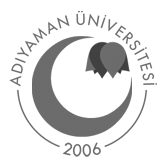Learning Turkish
With its different dialects, Turkish is spoken in a much more common geography than it is thought in the world. For example, in countries such as Germany, France, Netherlands, Macedonia, Greece in Europe and millions of people in a vast geography in Central Asia speaks Turkish as a native or second language. In addition, according to 2018 data, Turkey's top export countries are Germany, United Kingdom, Italy, the US, Iraq, Spain, France, Netherlands, Belgium, Israel, Romania, Russia, Poland and China (UAE, Saudi Arabia, Bulgaria , Iran, Greece, Egypt, Algeria).
Thus, learning Turkish is not only a condition that you should meet for your educational life in Turkey, but also an advantage after graduation. Also, no matter what language your academic education in Turkey is, speaking Turkish at a minimum level will greatly facilitate your daily life.
Turkish Proficiency
While the language of instruction in some of the universities in Turkey is English, Turkish is the main language of instruction in most universities. Although Turkish language proficiency is a prerequisite D in terms of admission to many academic programs, you can also be admitted to universities without knowing Turkish. After admission to undergraduate or graduate programs at many universities, international students are given the opportunity to attend Turkish preparatory courses. For a reasonable fee, or in some cases, for free you usually get 4-6 hours of language lessons per day at different levels. At the end of the preparatory school, all students take the exam and begin the program at the university where they are admitted in the case of a certain level of language proficiency. Please also check that you are provided with supportive Turkish language courses separately from the preparatory school at the school where you are admitted.
Students who are admitted to a university within the scope of Turkish scholarships that meet the expenses such as university contribution, dorm fee and general health insurance are also able to receive free Turkish education for an academic year. At the end of preparatory class, students are expected to receive Turkish proficiency certificate at level C1. Students who have a C1 certificate continue their university education. Students who fail are entitled to additional time and examination until the beginning of the next academic year.
Yunus Emre Institute (https://www.yee.org.tr/)
You can apply to Yunus Emre Institutes (YEE) to learn Turkish before starting higher education in Turkey and even before arriving in Turkey. YEE, which aims to contribute to international dialogue by introducing Turkish culture, language and art, today serves with a total of 58 centers in 46 different countries. To access YEE and educational-cultural activities in your country: https://www.yee.org.tr/en/corporate/yunus-emre-institute
In addition to teaching Turkish as a foreign language by YEE, Turkish Proficiency Exam (TYS) is also held. TYS is a central exam which is valid for admission of international students to a university in Turkey; applied three times a year in Yunus Emre Institutes in Turkey and abroad simultaneously. First exam of 2019 was applied in 35 countries and more than 100 thousand candidates participated in the exam.
Developed according to Common European Framework Programme, TYS measures competencies of candidates in reading, listening, writing and speaking skills. At present, studies on application of TYS online, which is applied on paper basis, are ongoing.
For detailed information about TYS and the exam schedule: https://www.tys.yee.org.tr/
TÖMER
After arriving in Turkey, you can apply to Turkish and Foreign Languages Application and Research Center (TÖMER).
